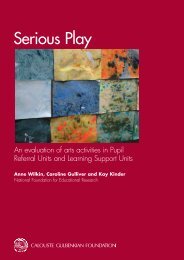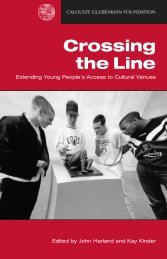Why Restorative Justice? - Calouste Gulbenkian Foundation
Why Restorative Justice? - Calouste Gulbenkian Foundation
Why Restorative Justice? - Calouste Gulbenkian Foundation
You also want an ePaper? Increase the reach of your titles
YUMPU automatically turns print PDFs into web optimized ePapers that Google loves.
THE NEED FOR CHANGE<br />
But, as Susan Herman, Director of the National Victims<br />
Center in Washington, has pointed out, mediation cannot be the<br />
answer to all victims’ needs. Most crimes are not reported, and of<br />
those that are, most are not solved. Offenders may not wish to take<br />
part in mediation. And those that do may have such limited<br />
resources that victims’ long-term medical, psychological or<br />
financial needs are unlikely to be met. Some seriously damaged<br />
victims will still need long-term support that can only come from<br />
the state. Nevertheless, very real benefits are reported by victims<br />
and offenders who have taken part in mediation.<br />
Jason’s story<br />
Jason, a persistent young burglar, had been in court many times from the<br />
age of 15. Whatever the magistrate said went in one ear and out of the<br />
other. For him, the risk of punishment was an occupational hazard – it<br />
was certainly no deterrent. As a child, Jason had often been left on his<br />
own with only a box of cornflakes to eat while his mother went to the pub.<br />
His first thefts were of food from local shops. He then joined other youngsters<br />
on the estate to become an active burglar.<br />
Jason often returned to the scene of the crime again and again. He<br />
had stolen from the house of a woman nearby more than 11 times, taking<br />
cash, cameras and television sets – which she replaced each time. He also<br />
stole goods of sentimental value, whose loss added to her distress.<br />
Such burglaries are often justified by young offenders like Jason on<br />
the grounds that things stolen will be replaced – and upgraded fraudulently,<br />
they assume – through insurance. That view implicates the victims<br />
in gaining from their own loss, a kind of rough compensation. Jason saw<br />
such cheating as all part of the game. Until they have been burgled themselves,<br />
young offenders often feel no empathy for the victims of the harm<br />
they have done, for the deeply unsettling experience of being invaded by<br />
strangers, nor for the pain of losing apparently worthless personal items.<br />
Jason’s most frequent victim found her successful life as a single<br />
mother, running a business from home, deeply affected by him. His burglaries<br />
terrified her into transforming her pleasant open-plan home into a<br />
fortress, adding more alarms and barriers each time. Jason saw these not<br />
as a deterrent but as a challenge. She finally installed iron gates which he<br />
told me were useless: he could break in from the back.<br />
Although Jason had been caught often – and spent time inside – no<br />
one had told him about his primary victim. Despite having touched each<br />
16

















